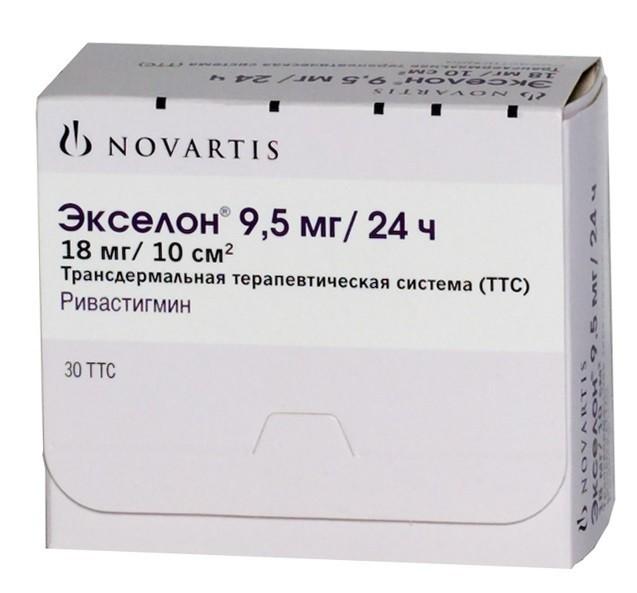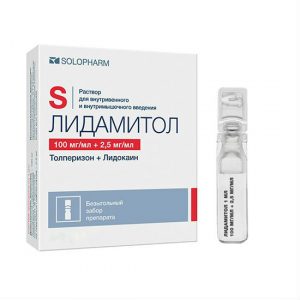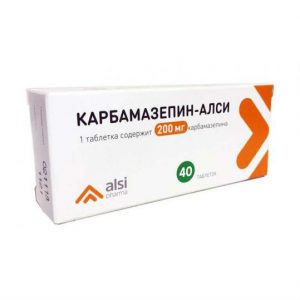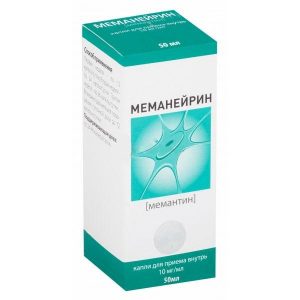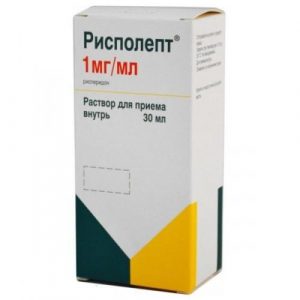Description
Release form
Transdermal therapeutic system (TTC)
Packing
30 pcs.
Pharmacological action
Exelon is a selective inhibitor of acetyl and butyrylcholinesterase in the brain, used to treat Alzheimer’s disease and dementia in Parkinson’s disease.
Rivastigmine slows down the destruction of the acetylcholine mediator produced by functionally preserved neurons. At the same time, rivastigmine selectively increases the content of acetylcholine in the cerebral cortex and the hippocampus, and, thus, helps to improve cholinergic neural transmission.
Exelon may have a beneficial effect on cognitive decline associated with acetylcholine deficiency, in particular dementia associated with Alzheimer’s and Parkinson’s disease.
In addition, there is evidence that that inhibition of cholinesterases can slow down the formation of fragments of the protein precursor of amyloid beta, which is involved in amyloidogenesis, and thus slow down the formation of amyloid plaques, which are one of the main pathological signs of Alzheimer’s disease.
Rivastigmine interacts with the target enzyme to form a covalent bond, which leads to temporary inactivation of the enzyme. It has been shown that in healthy young men after taking Exelon at a dose of 3 mg, the activity of acetylcholinesterase in the cerebrospinal fluid (CSF) decreases by approximately 40% during the first 1.5 hours. After reaching the maximum inhibitory effect, the enzyme activity returns to its original level after about 9 hours. Shown that the activity of butyrylcholinesterase in CSF in young healthy volunteers is inhibited reversibly and is restored to the original after 3-6 hours. In patients with Alzheimer’s disease, inhibition of rivastigmine activity of acetylcholinesterase in CSF is dose-dependent in the studied dose range (up to the highest dose of 6 mg twice a day). And
inhibition of butyrylcholinesterase is also dose-dependent: a dose of 6 mg 2 times a day causes a decrease in enzyme activity by more than 60% compared to the original. This effect of Exelon persisted for 12 months of therapy (maximum studied period). Statistically significant correlations were shown between the degree of rivastigmine inhibition of both enzymes in the CSF and changes in cognitive function in patients with Alzheimer’s disease, namely, the inhibition of butyrylcholinesterase in CSF reliably and stably correlates with the improvement of the results of tests of memory, attention and speed of reaction.
The efficacy of Exelon therapy for Alzheimer’s disease has been shown in patients with mild to moderate severity of dementia (10-24 points on a brief scale for assessing mental status, Mini Mental State Examination, MMSE). According to clinical studies, Exelon therapy leads to a significant improvement in cognitive functions (attention, memory, speech, etc.), functional status and activity in everyday life, as well as a decrease in the severity of the disease and the severity of mental and behavioral manifestations (such as agitation, tearfulness, illusions, hallucinations, etc.).
studies have shown that the effect of Exelon therapy is observed approximately at the 12th week and persists for 6 months of therapy, while for the control period in the group of patients receiving placebo, a decrease in the corresponding indicators was observed.
For dementia associated with Parkinson’s disease, Exelon’s efficacy was demonstrated in a placebo-controlled study lasting 24 weeks in patients with mild to moderate severity of dementia (10-24 points for MMSE). In patients receiving Exelon, a statistically significant improvement in cognitive functions (attention, memory, speech, etc.) was noted, while in patients receiving placebo, similar indicators worsened.
Indications
Mild to moderate Alzheimer’s type of dementia:
– Probable Alzheimer’s disease.
– Alzheimer’s disease.
Contraindications
– Hypersensitivity to rivastigmine and other components of the drug.
– Hypersensitivity to other carbamate derivatives.
Caution:
– Rivastigmine (like other cholinomimetic agents) should be used in patients with CVD or conduction disturbances (sinoatrial block, AV block).
– Cholinergic stimulation can increase the secretion of hydrochloric acid in the stomach, lead to increased obstruction of the urinary tract and exacerbation of convulsive syndrome, therefore caution should be exercised when prescribing rivastigmine to patients predisposed to these conditions.
– The drug should be used in patients with a history of bronchial asthma or obstructive airway diseases.
– The dose of the drug should be selected if the dose of rivastigmine (TTC Exelon 9.5 mg / 24 h) is exceeded in patients weighing less than 50 kg (in such cases there was a more frequent development of adverse reactions and the need to stop therapy) and in patients with severe disorders liver function (as more frequent development of adverse reactions is possible).
Use during pregnancy and lactation
The safety of rivastigmine during pregnancy in humans has not yet been established, therefore, the drug can be prescribed to pregnant women only when the expected benefit of the treatment exceeds the potential risk to the fetus. It is not known whether rivastigmine with breast milk is excreted in humans. Therefore, during the use of the drug should abandon breastfeeding. In experimental studies, it has been shown that rivastigmine does not have teratogenic properties.
Special instructions
The incidence and severity of side effects usually increase with an increase in the dose of rivastigmine, especially during the period of dose change. The severity of adverse effects from the digestive system, such as nausea and vomiting, observed at the beginning of treatment or with an increase in the dose of the drug, can decrease with a decrease in the dose of rivastigmine. If Exelon therapy is interrupted for several days, titration with Exelon TTC should be started again 4.6 mg / 24 h.
Since patients with Alzheimer’s disease may experience a decrease in body weight during therapy with cholinesterase inhibitors, including rivastigmine, it should be monitored during TTC body weight of patients.
The use of rivastigmine in children has not been studied, therefore, it is not recommended to prescribe the drug to children and adolescents under 18 years of age.
Patients receiving rivastigmine therapy may develop dizziness and insomnia, especially at the beginning of treatment or when the dose of the drug is changed. The ability of a patient with dementia receiving treatment with a drug to drive vehicles and / or work with mechanisms should be regularly evaluated by the attending physician.
Composition
1 TTC contains:
Active substances: rivastigmine 9.5 mg.
Excipients: D, L -? – tocopherol, poly (butyl methacrylate, methyl methacrylate), acrylic copolymer.
Composition of the adhesive layer: silicone copolymer, dimethicone (silicone oil 12.500 cSt), D, L -? – tocopherol.
Dosage and Administration
Exelon therapy should only be carried out under the supervision of a physician experienced in treating patients with Alzheimer’s type dementia. The amount of rivastigmine contained and released depending on the dosage of TTC Exelon is presented in the table.
Initial dose: treatment with the drug should begin with the use of TTC Exelon 4. 6 mg / 24 h 1 time / day. After 4 weeks of treatment, if well tolerated, the dose can be increased by using TTC Exelon 9.5 mg / 24 h.
Maintenance dose: For long-term treatment if the patient has therapeutic efficacy, it is recommended to use TTC Exelon 9.5 mg / 24 h.
patients to achieve a therapeutic effect may require an increase in the dose of the drug. It is necessary to temporarily discontinue therapy with the drug in case of adverse events from the digestive system and / or worsening of existing extrapyramidal symptoms (including tremor) until they are resolved. If the interruption in the use of the drug was several days or more, treatment should be resumed with the initial dose (Exelon TTS 4.6 mg / 24 h) to reduce the risk of resumption of adverse reactions (for example, severe vomiting).
If adverse events persist, the daily dose should be reduced to the previous well-tolerated dose.
Patients who received treatment with rivastigmine in the form of capsules or oral solution can be transferred to Exelon TTS treatment as follows: in patients receiving rivastigmine oral therapy at a dose of less than 6 mg / day, treatment should begin with Exelon TTC 4.6 mg / 24 hours in patients receiving oral rivastigmine therapy at a dose of 6-12 mg / day, treatment can begin immediately with TTC Exelon 9.5 mg / 24 h.
It is recommended to start TTC Exelon treatment the day after the last oral dose oz rivastigmine.
In patients with impaired renal or hepatic function: Exelon TTS dosing regimen is not required.
Side effects
The overall incidence of adverse events during therapy with Exelon TTC 9.5 / 24 h (50.5%) was lower compared with oral therapy using capsules in a daily dose of 3-12 mg (63.3%) (for comparison, in the group placebo, the rate was 46%).
The most frequent reaction from the digestive system. Nausea (7.2%) and vomiting (6.2%) were noted much less frequently with the use of TTC Exelon 9.5 mg / 24 h compared with capsules for oral administration, 23. 1% and 17.0%, respectively (in the placebo group, the same indicators were 5.0% and 3.3%).
The frequency of adverse reactions in patients (291 people) with Alzheimer’s type dementia who received TTC Exelon therapy (all dosages) was determined as follows: very often (? 1/10), often (? 1/100, less than 1/10) , infrequently (? 1/1000, less than 1/100), rarely (? 1/10 000, less than 1/1000), very rarely (less than 1/10 000), undesirable reactions are presented separately, the frequency of which is not precisely established.
Infectious and parasitic diseases: often – urinary tract infections.
From the side of metabolism: often – anorexia.
From the nervous system: often – anxiety, depression, delirium, headache, fainting very rarely – extrapyramidal disorders frequency unknown – hallucinations.
From the cardiovascular system: infrequently – bradycardia, cerebrovascular accident.
From the digestive system: often – nausea, vomiting, diarrhea, dyspepsia, abdominal pain infrequently – stomach ulcer.
Dermatological reactions: often a rash.
On the part of the body as a whole and reactions at the site of TTC attachment: often – erythema, swelling and itching, irritation, inflammation at the site of application, increased fatigue, asthenia, fever, weight loss.
In clinical trials with the use of the drug in doses of more than 9.5 mg / 24 h, the following adverse reactions were noted much more often than in the TTC Exelon 9.5 mg / 24 h and placebo groups: dizziness, insomnia, agitation, decreased appetite, atrial fibrillation, heart failure (possibly related to an increase in dose). The frequency of these adverse reactions during therapy with TTC Exelon 9.5 mg / 24 h was similar to that in the placebo group.
The following adverse reactions were observed only with capsule or Exelon oral solution and were not registered with TTC Exelon 9.5 mg / 24 h: dizziness (very often), agitation, drowsiness, general malaise, tremor, confusion, sweating (often), insomnia, accidental falls, increased liver activity (sometimes), convulsions, duodenal ulcer, angina pectoris, myocardial infarction (rare), arrhythmias (e.g., AV block, atrial fibrillation I, tachycardia), increased blood pressure, pancreatitis, gastrointestinal bleeding, hallucinations (very rare) in some cases – severe vomiting, leading to rupture of the esophagus (frequency unknown).
Dermatological reactions
When using TTC Exelon, the most frequently observed reddening of the skin (erythema) at the site of application, usually disappearing in most patients within 24 hours, in clinical trials with TTC Exelon 9.5 mg / 24 h, mild (21.8%), moderate (12.5%), severe (6.5%) redness of the skin, mild itching (11.9%), moderate (7.3%) and severe (5%) degree.
During therapy with TTC Exelon 9.5 mg / 24 h, pruritus and erythema were observed in 1.7% and 1.1% of patients, respectively. Most skin reactions developed only in the area of TTC application. When using TTC Exelon 9.5 mg / 24 h, discontinuation of drug treatment due to the development of dermatological reactions was noted in only 2.4% of cases.
Drug Interactions
There has been no special study of the interaction of Exelon TTC with other drugs. Rivastigmine is metabolized mainly by hydrolysis with the participation of esterases. The metabolism of rivastigmine with the participation of the main isoenzymes of cytochrome P450 occurs to a minimum. Thus, the pharmacokinetic interaction of rivastigmine with other drugs metabolized with these enzymes is not expected.
In healthy volunteers, no pharmacokinetic interaction between rivastigmine and digoxin, warfarin, diazepam, or fluoxetine was detected. The increase in prothrombin time caused by warfarin did not change with the administration of rivastigmine. With the simultaneous use of rivastigmine and digoxin, no adverse effect on intracardiac conduction was noted.
Concomitant use of rivastigmine with commonly used drugs such as antacids, antiemetics, oral hypoglycemic drugs, central antihypertensive drugs, beta-blockers, calcium channel blockers, drugs that have a positive inotropic effect, antianginal drugs, estrogens, analgesics, benzodiazepines and antihistamines, was not accompanied by any changes in the kinetics of rivastigmine or an increased risk of clinically significant adverse events.
Since rivastigmine has an effect on cholinergic structures, it should not be prescribed together with cholinomimetic drugs, and when administered concurrently with anticholinergics, the multidirectional effects of these drugs and Exelon TTC should be taken into account.
During anesthesia, rivastigmine, being an inhibitor of cholinestrase, may enhance the effects of depolarizing muscle relaxants (succinylcholine type muscle relaxants).
overdose
Symptoms: In most cases, an accidental overdose of the drug was not accompanied by any clinical manifestations of virtually all patients continued with rivastigmine treatment. At an overdose nausea, vomiting, diarrhea, the expressed increase in BP, hallucinations were noted. Given the vagotonic effect of cholinesterase inhibitors on heart rate, the occurrence of bradycardia and / or syncope cannot be excluded. In one case, 46 mg of the drug was taken after conservative treatment after 24 h complete recovery was observed.
There are no data on overdose with TTC Exelon.
Treatment: since T 1/2 of rivastigmine from plasma is about 3.4 hours and the duration of inhibition of acetylcholinesterase is about 9 hours, in cases of asymptomatic overdose it is recommended not to use TTC Exelon for the next 24 hours. If overdose is followed by severe nausea, consider the use of antiemetic agents. If other undesirable phenomena occur, appropriate symptomatic treatment is carried out if necessary. With a significant overdose, atropine sulfate may be used, the initial dose of which is 0.03 mg / kg IU / subsequent dosing depends on the clinical effect. The use of scopolamine as an antidote is not recommended.
Storage conditions
The product should be stored in a dry place at a temperature not exceeding 25 ° C.
Shelf life
2 years.
Active ingredient
Rivastigmine
dosage form
transdermal system
Possible product names
EXELON 0.0095 / 24 HOURS N30 TRANSDERM THERAPEUT S-MA
Exelon pl. 9mg / 5cm2 No. 30
Exelon plaster 9.5mg / 24h N30 sondlk patch 30mg PCS.
Exelon TDTS 9. 5mg / 24h package N30 Germany-Switzerland
Novartis Farma Stein AG, switzerland s
